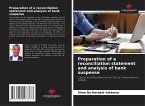Banking accounting is similar to corporate accounting, but has its own specific features and responds to different concerns: prudential control, risk measurement, particularly in relation to financial instruments, etc. The accounting standards applicable to banks and companies are constantly evolving. For example, banks have had to write down many of their assets because they have become illiquid; conversely, they have boosted their earnings by reversing impairments. However, we should not 'throw the baby out with the bathwater', as these standards have many advantages: standardisation and comparability, easier prudential supervision, etc. In a context of financial stability, the quality of accounting standards is very important. Accounting information is the input used to measure compliance with regulations: it must be reliable, relevant and timely.
Bitte wählen Sie Ihr Anliegen aus.
Rechnungen
Retourenschein anfordern
Bestellstatus
Storno








